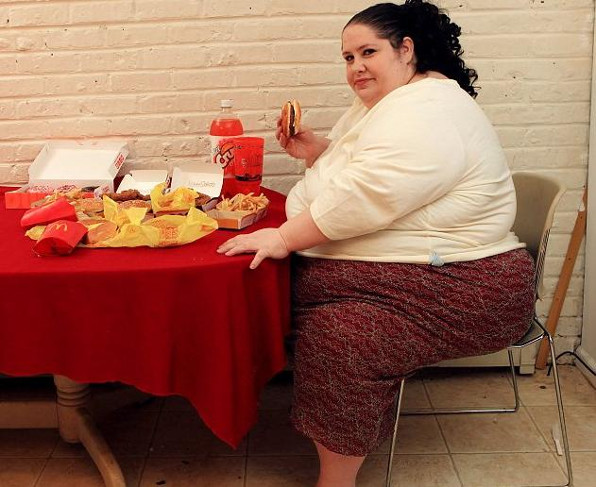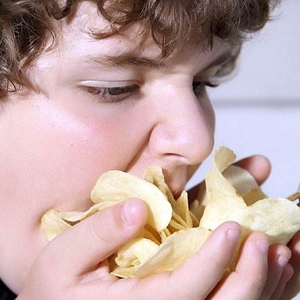Researchers from the University of São Paulo (USP) in Brazil have confirmed something we all have suspected for some time: Restricting our Calorie intake can be beneficial in a wide range of heretofore unconfirmed ways, not just helping us to stay off the obesity bandwagon…
 Not doing herself any favours: This person is not only putting herself
Not doing herself any favours: This person is not only putting herself
at risk of early death from heart disease, but higher risk of
a number of brain disorders and type 2 diabetes.
We all know a lower-Calorie diet can help us fight obesity and, by association, improve our heart health. It can also help us avoid type 2 diabetes and other metabolic diseases. But, now, researchers have discovered that a lower-Cal diet can also protect the brain from neuronal cell death associated with diseases such as Alzheimer’s, Parkinson’s, Epilepsy and Cerebral Vascular Accident (CVA).
What they did…
Scientists studied two parallel groups of mice. One group received its usual free-feeding amount of food while the other group was given 40 percent less than that. The mice were observed over a 14 week period, then tested as to their reactions to various disease symptom-producing stimuli. Researchers also conducted in vitro experiments directly on mouse brain cells, which helped them determine how the process worked. They also studied the direct effects the lower-Calorie diet had on the Pancreas, which produces Insulin.
What they found…
A Calorie-restricted diet can trigger beneficial reactions in the body that higher-Calorie diets seem to suppress.
In the brain, it can cause mitochondria – the structures that are responsible for energy production in cells – to increase Calcium uptake capacity, protecting against Calcium overload in the system.
In the pancreas, the calorie-restricted diet improved the organ’s reaction to increased levels of blood Glucose, thus guarding against type 2 diabetes.
The takeaway…
A Calorie-restricted diet could help us all live healthier lives, even if it makes eating less of a pleasure and more of a chore.
My take…
I’m all for better health, but I also really, really love my food. What’s a borderline fatty to do?
First of all, I think that one of the most important things we can do to promote lower-Cal diets is to make food as flavourful and satisfying as possible. Meaning we won’t feel unsatisfied when we eat less.
Another thing we can do is encourage restaurants to offer smaller portions (with associated smaller prices) for those of us who want to restrict our Caloric intake. Kudos (yes, kudos!) to the Fast Food sector, which already routinely offers several different sizes of Burgers, Fries and beverages in its attempt to tempt all appetites. Following the same line, food processors and manufacturers should be encouraged to sell their products in smaller-portion packages, which in turn would encourage consumers to eat less, even then they ‘scarfe the whole bag’ of Chips or Cookies or whatever.
We all need to shift our focus to other aspects of life, away from the never-ending craving for food – specifically Salty, Sweet and Fatty concoctions. It’s just natural, wired into us biologically thanks to evolution. But we can all make a conscious effort to pass up that Doughnut in the staff meeting, or resist that bag of Chips at the checkout.
In the end, though, all these suggestions rely on us as individuals to change our outlook on eating and what we get from the experience. And that’s a very tall order to fill…
~ Maggie J.

